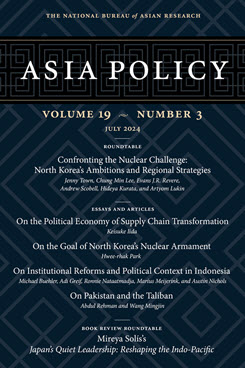Article in Asia Policy 19.3
Ending the Debate about the Goal of North Korea’s Nuclear Armament
This article examines the debate between two schools of thought on why North Korea has developed and maintained a nuclear arsenal, considers the evidence, and argues that North Korea has developed nuclear weapons with ambitions to pursue a hostile reunification with South Korea.
Executive Summary
MAIN ARGUMENT
There has been a continuous debate in South Korea, and in the U.S. as well, between the following two perspectives: that North Korea developed its nuclear weapons (1) for the reunification of the whole of Korea or (2) for the North Korean regime’s safety. South Korea’s North Korea policies have depended on the perspective of each of its successive political leaders. Based on three areas of evidence, however—North Korea’s excessive nuclear buildup, behavior in denuclearization negotiations with the U.S., and, most of all, recent blatant threats to attack and annex South Korea—it is time to conclude that the goal of North Korea’s nuclear armament is not regime safety. South Korea should prepare for worst-case scenarios based upon the premise that North Korea seeks hostile reunification.
POLICY IMPLICATIONS
- The U.S. should demonstrate its strong resolve and nuclear deterrence capabilities to convince North Korean leaders that its nuclear umbrella over South Korea will not be subject to intimidation.
- The U.S. should consider increasing a more tangible nuclear presence around the Korean Peninsula, for example, by consistently and frequently deploying its ballistic missile submarines near South Korea, as it has already started to do.
- If the situation worsens and North Korea becomes more assertive, Washington may want to consider the deployment of a few tactical nuclear bombs to Guam to demonstrate its speedy and assured retaliation capability.
- Washington should review the suitability, feasibility, and acceptability of its redeployment of tactical nuclear weapons to South Korea if a North Korean nuclear attack were to become imminent.
- The ROK-U.S. Combined Forces Command and the United Nations Command should consider stepping up nuclear deterrence and defense actions to dissuade or deny potential provocations by North Korea.
- Washington and Seoul may want to discuss how to increase the potential for emergency nuclear armament without violating South Korea’s nonproliferation policies.
Hwee-rhak Park is a Special Affairs Professor at Kookmin University in Seoul, South Korea, where he researches international relations in the Asia-Pacific area. His research interests and publications have focused on the North Korean nuclear threat. His recent publications include “Searching for On-Site Nuclear Balance Against North Korea,” Comparative Strategy (2023); “The Necessity to Discuss ‘Deterrence Failure’ regarding North Korea’s Nuclear Threat,” International Studies (2023); and “Compellence and BATNA for the Denuclearization of North Korea,” International Negotiation (2023).
About Asia Policy
Asia Policy is a peer-reviewed scholarly journal presenting policy-relevant academic research on the Asia-Pacific that draws clear and concise conclusions useful to today’s policymakers. Asia Policy is published quarterly in January, April, July, and October and accepts submissions on a rolling basis. Learn more


